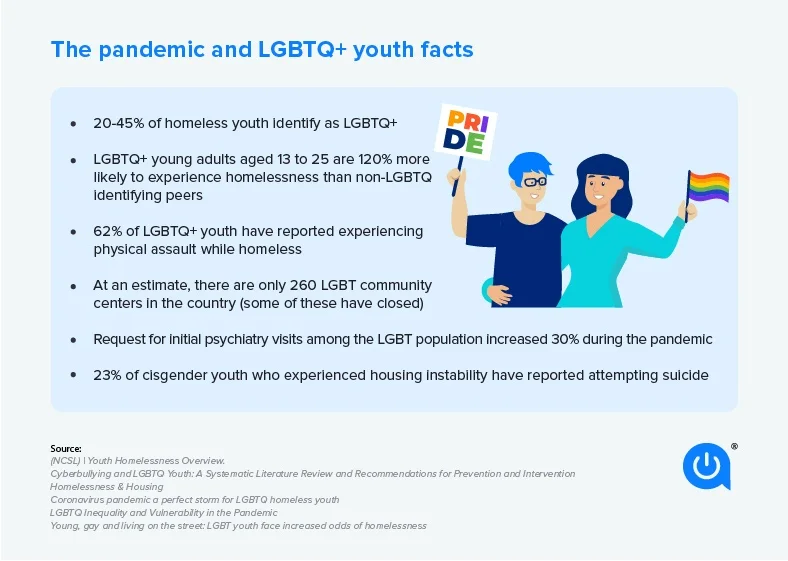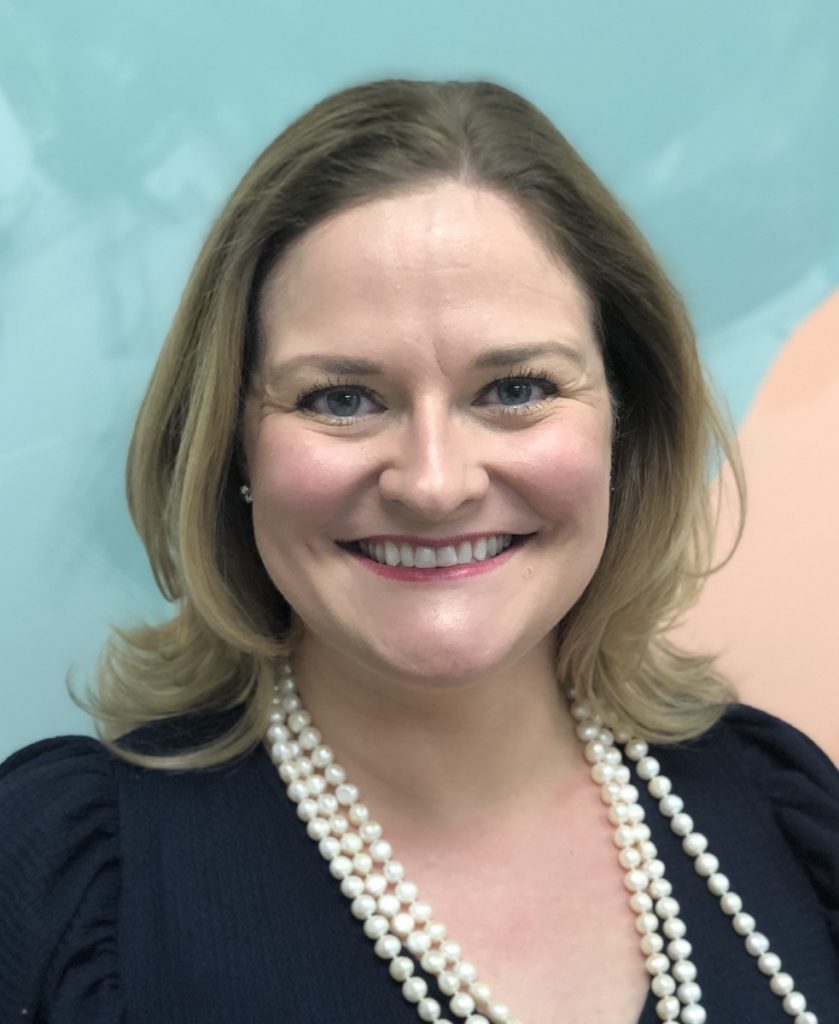Written by: Robin Layton
As Americans regroup after two years of a pandemic lifestyle, studies are revealing that youth who are in the sexual and gender minority are experiencing depression and anxiety at a faster rate than other groups.
In fact, The Trevor Project 2022 National Survey on LGBTQ Youth Mental Health found that “45% of LGBTQ youth seriously considered attempting suicide in the past year,” with 60% of the youth who wanted mental health care in the past year unable to access it. The survey also found that 73% of LGBTQ youth reported having symptoms of anxiety.
Being an LGBTQ young person, unfortunately, means that during their critical adolescent years, they can often feel isolated and misunderstood, lacking the resources they need to maintain their mental health.
With pandemic-related measures in place across the country, youth are at an even greater risk of social isolation and depression. But online resources, including supportive and educational materials, can help them maintain mental and emotional health.
In a Catch-22, the internet can make this necessary information accessible, but only if you have access to the internet.
In this guide, Allconnect researchers take a look at available online resources, as well as address the digital divide and homeless issues within the LGBTQ youth community.

LGBTQ youth can face some unique challenges, such as higher rates of depression and suicide than their peers. A behavioral health report on youth.gov noted that suicide is the third leading cause of death among youth and young adults, and up to 33% of LGBTQ youth report having attempted suicide. LGBTQ high school students are also two to seven times more likely to commit suicide than their peers.
Along with all the pressures of growing into their own identities, they have increased risks of alcohol and drug use, bullying, peer pressure, depression, suicide attempts and high-risk sexual activities. LGBTQ youth and young adults may be kicked out of their homes, and often face homelessness.
Identifying as LGBTQ doesn’t cause depression or mental health issues. The cause is rooted within outside factors: Discrimination, family rejection, negative biases and bullying and hostile microaggressions that can lead to suicidal ideation, according to the report. When LGBTQ youth aren’t accepted for who they are, they have higher rates of stress, anxiety, depression, self-harm behaviors and other disturbances to mental health.
In addition, many LGBTQ youth are confronted with online bullying. Pre-pandemic, 32% of teens aged 14-17 spent about four hours in front of screens. As of June 2020, that number leaped to 62%, according to a Statista report.
Cyberbullying has made the internet a dangerous place for LGBTQ youth, and approximately 48.7% of LGBTQ students are victims of cyberbullying each year. This can be through private text messages or public posts on social media. Cyberbullying leads to high rates of psychological and emotional distress for LGBTQ+ youth, as well as low self-esteem, social isolation, depression and thoughts of suicide.
Other resource and advocacy groups
- The National Coalition of Anti-Violence Programs – The program offers direct services to survivors of all forms of violence and their circle of family and friends. They also work on policy and advocacy, and provide “free, holistic legal services to LGBTQ and HIV-affected survivors in all five boroughs of New York City in Family Court, Housing Court, Civil Court and with immigration matters.”
- GLAAD LGBTQ Resource List – GLAAD shares stories from the LGBTQ community and this list includes resources in politics, military, aging, legal and other sectors.
- The TrevorLifeline – Provides a national crisis intervention and suicide prevention lifeline for LGBTQ youth.
- Homelessness Help – Provides resources for homeless LGBTQ individuals in crisis, as well as provides a reporting platform for housing discrimination or violations.
- National Runaway Safeline – A hotline for youth who need someone to hear them, as well as for concerned adults.
- The LGBT National Youth Talkline – Free and confidential peer support for LGBTQ youth 25 and under.
- Trans Lifeline – Run by trans people, this lifeline provides peer support.
- National Suicide Prevention Lifeline – Free and confidential support for anyone in distress, suicide prevention and resources.
- TheRecoveryVillage.com – A free web resource that provides information about addiction, eating disorders and mental health issues.
- Drug Rehab USA – An accurate directory of LGBTQIA+ friendly drug and alcohol rehabilitation centers in the US
- Grow Resolve – Includes information like articles on substance use being more common in LGBTQ+ populations, ways to find local peer-led and queer-affirming support groups, guides to building a sober-supportive lifestyle, searches to finding insurance covering LGBTQ-affirming care, and tips on building sober-support networks
- Social Media Victims – An in-depth guide about the link between social media use and suicide as well as how you can assist a friend or child if you think they are suicidal.
By Beth Olson
How did you learn about sex when you were a kid?
I love the way adults laugh and respond to this question.
“I just remember my parents leaving a book in my room.”
“Our football coach taught us … kind of.”
“I didn’t learn anything!”
Then I ask …

Raise your hand if you wish your parents or another trusted adult had talked with you more about sex?
Almost every hand goes up.
And how many of you are comfortable talking to teens about sex and sexual health?
Almost every hand goes down … very quickly.
What is it about sex that makes even the most supportive parent (or other trusted adult) freeze up? You love your kids. You want them to be healthy adults. You equip them with the values and skills needed to navigate so many complex situations. Yet, somehow, the simplest anatomy question can stop Super Mom in her tracks.
But why?
Because it’s hard to talk about sex when we have no frame of reference for how the conversation should go.
You’ve been taught your whole life that sex is not an acceptable topic of conversation. It’s private, and it’s not polite. Your parents probably didn’t talk to you about sex. Or if they did, it felt like an awkward scene from an ’80s sitcom. Adults don’t even talk to each other about sexual health. Think about it. When was the last time you casually chatted about birth control side effects at a nice dinner party?
Simply put — we don’t get much practice saying sexual things out loud.
So, let’s change that. Over the next few months, I’ll explore effective ways to talk with teens about sexual health, boundaries, and relationships; how to build trust with young people; and address questions parents often have about sex education.
Together, we can create the first generation of adults who will proudly raise their hands and say, “My parents and mentors worked together to teach me about sex.”
CDC: Talking with Your Teens about Sex: Going Beyond “The Talk”

Beth Olson is director of adolescent health initiatives for Prosper Waco.
The Act Locally Waco blog publishes posts with a connection to these aspirations for Waco. If you are interested in writing for the Act Locally Waco Blog, please email Ferrell Foster at ferrell@prosperwaco.org.
by Leah Gorham, MAMFC, LPC
In early March, a Waco man was arrested for allegedly hitting a child in the face. The story was followed with additional arrests in other instances involving individuals who had sexually abused different children. According to the Children’s Advocacy Centers of Texas, 185 children in the state of Texas become victims of abuse each day. That is a staggering statistic that keeps me wanting to serve and empower more families. April is Child Abuse Awareness and Prevention Month and the Child-Safe Alliance is making efforts to reduce and eventually end all types of child abuse. STARRY is honored to partner with them by providing free counseling for children and families as part of the DFPS STAR program.
Child abuse prevention is a cause that is near and dear to my heart. I work with its victims on a daily basis and have become an advocate for child abuse prevention since I was a child. I remember being in elementary school when I first realized people were capable of hurting others. While some may call it “discipline,” leaving bruises and marks is never okay. Raising kids is difficult when you’re constantly being mom-shamed on social media for letting your kids eat that extra piece of candy. (Mostly because you’re so tired of the constant whining and screaming and all you want is a little peace and quiet!) Besides, we tell ourselves, My parents did that and I turned out okay. But … did we really? The only way to change the next generation is to do a little self-work. And the result could have a HUGE impact in the lives of our children.
What is one way to help families reduce the risk of child abuse and sharpen their parenting skills? I’m glad you asked! Trust-Based Relational Intervention® (TBRI®) is the brainchild of Dr. Karyn Purvis and TCU. From her research, Dr. Purvis found that empowering, connecting, and correcting children can help reduce child abuse and increase attachment and cohesion in families – especially children from hard places. Dr. Purvis published a book called Empowered to Connect, which I highly recommend you read. Over the next three weeks, I’m going to blog about the three principles outlined in the book and how to implement them into your life (with your current family or maybe your future family).
The first principle is empower. We all desire our children to succeed in life through their actions, education, emotions, relationships, etc. Empowerment focuses on using the child’s strengths and fostering a healthy view of self. Power struggles occur in relationships because we all desire to feel in control. Giving your child choices allows him or her to share the control. A word of caution helps set boundaries for the choices. Rather than saying that they can have any kind of snack after school, give them a choices of pretzels, veggie sticks, cheese crackers, or fresh fruit as options for the snack. It will help you keep your sanity and it’ll help you be able to say “yes” to more options. This will also build your child’s confidence in the fact that that they have power and can make good decisions. When kids feel in control of a few things, they are more likely to make better decisions and poor behaviors will likely decrease. There may be underlying issues too, so don’t be afraid to seek counseling for additional support. Next week, I’ll talk more about ways to connect with your child.
 Leah Gorham, MAMFC, LPC, is the Team Lead at the STARRY-Waco Counseling office that offers free counseling for children and families. She has been a Kid’s Hope Mentor for the past five years and is currently part of Leadership Waco.
Leah Gorham, MAMFC, LPC, is the Team Lead at the STARRY-Waco Counseling office that offers free counseling for children and families. She has been a Kid’s Hope Mentor for the past five years and is currently part of Leadership Waco.
The Act Locally Waco blog publishes posts with a connection to these aspirations for Waco. If you are interested in writing for the Act Locally Waco Blog, please email ashleyt@actlocallywaco.org for more information.
by Ellen Filgo
When my older son finally potty trained at age 3 years and 4 months, it was a relief to not have to change the diapers of my articulate, stubborn little boy who clearly could use the toilet (but just didn’t want to). It also meant that I no longer had two children in diapers. That’s right, our family had two in diapers for more than a year! It was a relief on our budget to save that money. Diapers are expensive. They can cost up to $100 a month per baby, which can stretch even a middle class family’s budget.
Now imagine you are the 1 out of 3 families in the country who struggle to afford diapers. There are 5.8 million babies in the United States aged 3 or younger who live in poor or low-income families. Not having enough diapers can mean that babies are left in soiled diapers longer or that parents re-use diapers that are meant to be single use. This can lead to health risks for the babies, such as rashes or infections. A clean supply of diapers is also required at the vast majority of childcare centers. If parents can’t provide them, they may not be able to enroll their children in early childhood programs, or even be able to enter the workforce themselves. Lack of access to diapers can sometimes hinder a parent in getting or staying employed at the job they need in order to become more financially self-sufficient.
There is no state or federal safety net program that allocates money for diapers. You cannot buy diapers with SNAP (food stamps) or WIC (a federal program that helps provide food for women, infants and children). Many existing social service organizations, focusing on hunger, homelessness, abuse or pregnancy try to provide diapers to the families they serve, but they rely on irregular donations and they are often lacking larger sized diapers for toddlers.
 This is where the Waco Diaper Bank comes in. Our mission is to collect donations of diapers in order and distribute them to those other social service organizations. We will focus on diapers so that they can focus on their main missions. Our main way of collecting diapers will be through diaper drives. These can be organized by the volunteers working with the diaper bank, or by other people – Girl or Boy Scout groups, schools, fraternities or sororities, businesses – anyone can organize a drive! The Waco Diaper Bank will distribute the donations to our partner social service agencies. If individuals want to donate money, we can take that too! We can use it to purchase diapers in bulk, which can be a cheaper way of collecting diapers.
This is where the Waco Diaper Bank comes in. Our mission is to collect donations of diapers in order and distribute them to those other social service organizations. We will focus on diapers so that they can focus on their main missions. Our main way of collecting diapers will be through diaper drives. These can be organized by the volunteers working with the diaper bank, or by other people – Girl or Boy Scout groups, schools, fraternities or sororities, businesses – anyone can organize a drive! The Waco Diaper Bank will distribute the donations to our partner social service agencies. If individuals want to donate money, we can take that too! We can use it to purchase diapers in bulk, which can be a cheaper way of collecting diapers.
To kick things off, the Waco Diaper Bank is hosting a community wide December Diaper Drive from the 1st to the 14th of December. All sorts of churches, organizations and businesses have signed up to be drop-off locations for donated diapers. We’ll take everything – all brands, sizes, packages; we’ll even take loose diapers, opened packages or the leftovers from a “diaper cake!” You can find the drop-off locations and more information about the diaper bank at our website www.wacodiaperbank.org .
About a year ago, when I first heard about what a diaper bank was, I immediately knew that Waco needed a diaper bank, for two reasons – well, actually three! First, because of the high rate of poverty in Waco. There are a lot of little bottoms that need to stay clean, dry and healthy here in town. Secondly, because of the existence of so many great social service organizations that are already doing wonderful things. Collaboration is the watchword here in town and the diaper bank model is inherently a collaborative one. And the third reason was something that I knew about Waco, but hadn’t really FELT until we started our diaper drive promotion – Waco is a town with a great big heart. There may be a lot of need in our community, but there is also a lot of love and a willingness to give and share. And that’s why I believe my hopes for the Waco Diaper Bank will ultimately become a reality.
 Ellen Filgo is a research librarian at Baylor and a Wacoan of 8.5 years. She loves living in Sanger-Heights with her husband, her stepson and her two energetic little boys. She has been known to get sidetracked researching the answer to a random question casually asked in a Facebook post.
Ellen Filgo is a research librarian at Baylor and a Wacoan of 8.5 years. She loves living in Sanger-Heights with her husband, her stepson and her two energetic little boys. She has been known to get sidetracked researching the answer to a random question casually asked in a Facebook post.
The Act Locally Waco blog publishes posts with a connection to these aspirations for Waco. If you are interested in writing for the Act Locally Waco Blog, please email ashleyt@actlocallywaco.org for more information.
